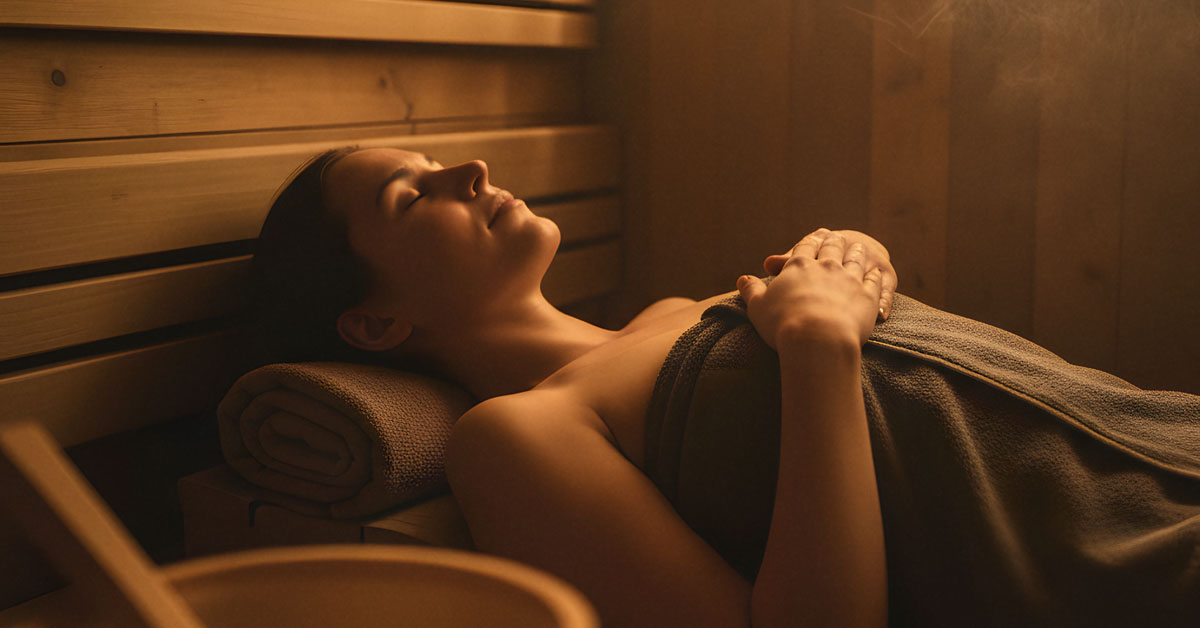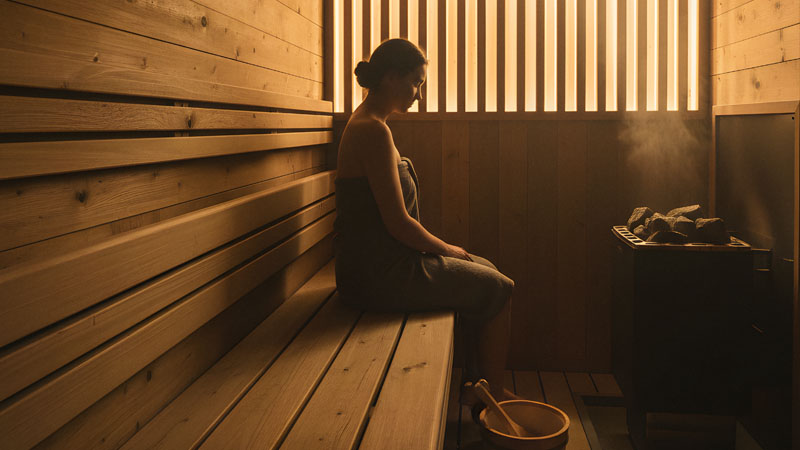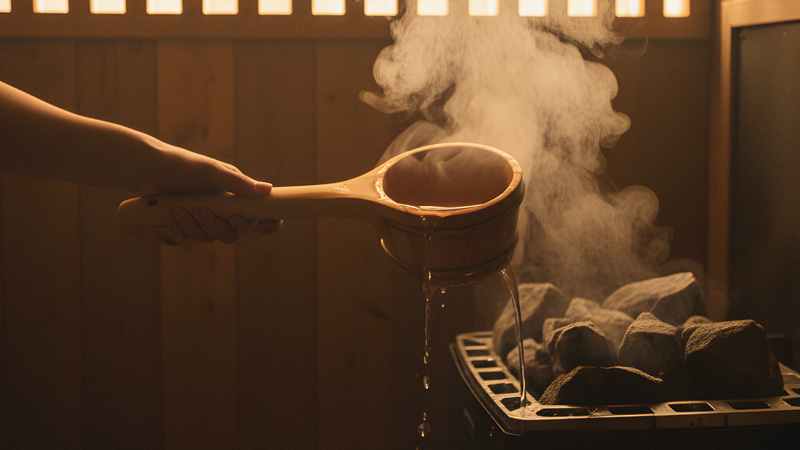
The sauna holds profound cultural significance worldwide, with ancient Finnish traditions at the heart of it. Today, it’s increasingly embraced worldwide and is becoming almost a universal way of life.
Here at our Finnish Saunazilla offices, we’re loudly advocating and branding the sauna lifestyle, so we thought we also needed to be able to define it, and explain it.
In practical sauna terms, “Sauna Lifestyle” can be defined as a holistic practice that incorporates regular sauna sessions into one’s routine for both physical health and mental well-being. But, of course, there’s much more to it.
Making Sauna Lifestyle a Commitment
Incorporating sauna sessions into your routine changes it from an occasional luxury into a cornerstone of wellbeing. The key to the full spectrum of sauna benefits lies in consistency rather than intensity. Research suggests that regular sauna use—even just 2-3 times per week—provides significantly more health benefits than just occasional sessions.
This regular rhythm allows your body to adapt progressively to heat exposure, enhancing the physiological benefits while making each session more comfortable and enjoyable.
Creating a realistic sauna schedule that aligns with your existing commitments increases the likelihood of maintaining the practice. Perhaps, following your workout sessions, as part of weekend relaxation rituals, or as an evening wind-down to improve sleep quality.
A Personal Sensory Experience
The true value of a sauna lies deeper than its physical benefits—it’s a sensory experience that engages all five senses and creates a unique space for reflection and renewal. When you step into a sauna, you’re literally embracing a multi-dimensional experience that can become transformative with regular practice.
Your senses immediately respond to the environment. The embrace of heat against your skin creates an initial sensation that signals to your body that it’s time to relax and let go. As the sweating begins, there’s a tangible feeling of release—both physical and mental.
The aromatic experience varies depending on the sauna type. In traditional saunas, the natural scent of cedar or pine wood creates an earthy foundation, while the water hitting the hot stones releases bursts of steam with subtle mineral notes. If you wish, you can enhance this with essential oils like eucalyptus, lavender, or birch, transforming each breath into an aromatic therapy session.

The Sauna as a Sanctuary from Stress
In our hyper-connected world, finding spaces truly free from distraction has become increasingly rare. The sauna stands as one of the last sanctuaries from the constant barrage of notifications, calls, and external demands. When you enter a sauna, you leave behind the devices that tether you to work, social media, and the endless stream of information.
This physical separation from technology creates a unique opportunity for mental decompression. The sauna environment, with its warmth and simplicity, naturally encourages presence and mindfulness. No distractions to fragment your attention—just you, the heat, and the present moment.
Cultivating Mindfulness Practices
The combination of physical comfort, limited distractions, and set time parameters creates perfect conditions for practicing presence.
Simple breathing exercises become naturally amplified in the sauna. Something as simple as focusing on your breath—observing the inhalation and exhalation without trying to change it—anchors you firmly in the present moment. The heat of the sauna makes breathing more noticeable, providing a natural focal point for attention.
Body scanning is another technique that pairs nicely with sauna sessions. Starting from the top of the head and moving slowly downward, bring awareness to each part of the body without judgment or the need to change anything. This enhances body awareness and often reveals tension patterns that can then be consciously released.
Creating Your Own Sauna Habits
The beauty of the sauna lies in its adaptability to personal preferences. You might prefer the intense dry heat of a traditional sauna, the gentle penetrating warmth of infrared sessions, or the humid embrace of steam saunas. Your sessions can be customized to your personal needs and preferences.
As you develop your own sauna practice, you notice how your body responds differently depending on the time of day, stress levels, or physical condition. This awareness can influence how you move through the world with greater body awareness, stress resilience, and appreciation for moments of stillness and purposeful relaxation in a busy world.
Perhaps the social aspect of sauna can also fit your personal preference. Sauna sessions can become more sustainable when shared with others. It can be with family members, friends, or as part of a community; it adds another dimension to the experience. In many cultures, sauna has traditionally been a communal activity that strengthens social bonds while improving health.

The Physiological Basis of Sauna Relaxation
The relaxation response triggered during sauna sessions has solid physiological foundations. As your body temperature rises, blood vessels dilate, heart rate increases slightly, and muscles receive increased blood flow. This physiological state naturally counters the body’s stress response, shifting from “fight or flight” to “rest and digest” nervous system activation.
The heat exposure in saunas has been shown to increase endorphin production—the body’s natural feel-good chemicals. This hormonal shift creates a mild “natural high” or deep sense of contentment that persists after the session ends.
There’s improved sleep quality, which creates a positive cycle for stress management. Better sleep leads to improved stress resilience, which enhances the quality of sauna relaxation, creating an upward spiral of wellbeing.
Sauna therapy also shows promising benefits for respiratory conditions. The warm, humid air in traditional saunas can help open airways and loosen mucus, providing relief for those with asthma, bronchitis, or congestion. The heat exposure may also strengthen respiratory muscles and increase lung capacity over time with consistent use.
Sauna bathing can offer remarkable benefits for skin health. The increased circulation brings nutrient-rich blood to the skin’s surface, while sweating helps clear pores of impurities. The combination of deep sweating and increased blood flow can improve skin elasticity and texture over time.
The stress-reduction effects of sauna bathing also support immune health, as chronic stress is known to suppress immune function. By incorporating regular sauna sessions into your lifestyle, you may experience fewer colds and infections while enjoying improved overall health resilience.
Mental Health Advantages
The mental health benefits of sauna bathing are equally significant. The release of endorphins reduces stress and promotes feelings of happiness. The quiet, meditative environment creates space for mental clarity and emotional processing.
Studies suggest that frequent sauna use may help reduce symptoms of anxiety and depression while improving overall mood.

Rhythms and Rituals
Feel free to develop your own personal rituals to enhance your experience. These personal nuances become an integral part of your sauna habits, creating a predictable rhythm that signals to both body and mind that it’s time for restoration.
The contrast between heat and cooling periods creates a really powerful physiological response that is invigorating and satisfying. The transition from the intense warmth of the sauna to a cool shower or an icy plunge pool creates a rush of sensation that heightens awareness and brings a renewed appreciation for the body’s remarkable adaptability.
Sauna as a Lifestyle Choice
Embracing the sauna can be a transformative lifestyle choice. Regular sauna sessions can spark other positive health changes—perhaps greater attention to hydration, improved sleep habits, or increased body awareness that could influence food choices and stress management.
The sauna lifestyle often includes learning about and appreciating sauna traditions from around the world. The broad cultural context and time-honored wisdom in the sauna’s long history are really interesting.
As sauna becomes integrated into your lifestyle, it often shifts from something you do to part of who you are—a person who values intentional rest, preventative health practices, and regular disconnection from technology and stress. This identity shift helps maintain consistency even when life gets busy, as the practice becomes a non-negotiable aspect of your personal health approach.
We also have a Sauna Lifestyle t-shirt for sale, so grab one for yourself!
Sauna Lifestyle FAQ
What exactly is the “sauna lifestyle”?
The sauna lifestyle is a holistic practice that incorporates regular sauna sessions into your routine for both physical health and mental well-being. It’s about making sauna a consistent part of your life rather than an occasional luxury, and embracing it as a cornerstone of overall wellness.
How often should I use a sauna to experience real benefits?
Research suggests that using a sauna 2-3 times per week provides significantly more health benefits than occasional sessions. The key is consistency rather than intensity. Regular use allows your body to adapt progressively to heat exposure, enhancing physiological benefits while making each session more comfortable.
Should I use sauna alone or with others?
This is entirely personal. Some people prefer the solitary, meditative experience, while others find that sharing sauna sessions with family, friends, or community members makes the practice more sustainable and enjoyable. In many cultures, sauna has traditionally been a communal activity that strengthens social bonds.
What are the main physical health benefits?
Regular sauna use offers numerous physical benefits including improved cardiovascular health, better sleep quality, enhanced skin health through increased circulation and deep sweating, respiratory relief for conditions like asthma and bronchitis, and strengthened immune function leading to fewer colds and infections.
How does sauna help with mental health?
Sauna sessions trigger endorphin release, reducing stress and promoting feelings of happiness. The quiet, meditative environment creates space for mental clarity and emotional processing. Studies suggest frequent sauna use may help reduce symptoms of anxiety and depression while improving overall mood.
Can I practice mindfulness during sauna sessions?
Absolutely. The sauna’s combination of physical comfort, limited distractions, and set time parameters creates perfect conditions for mindfulness. Simple breathing exercises become naturally amplified, and body scanning techniques pair well with the heat, helping you develop greater body awareness and release tension.
How do I maintain consistency with sauna sessions?
Create a realistic schedule that aligns with your existing commitments. Make sauna a weekly commitment rather than an occasional indulgence. As the practice becomes integrated into your lifestyle, it often shifts from something you do to part of who you are, making it easier to maintain even when life gets busy.


